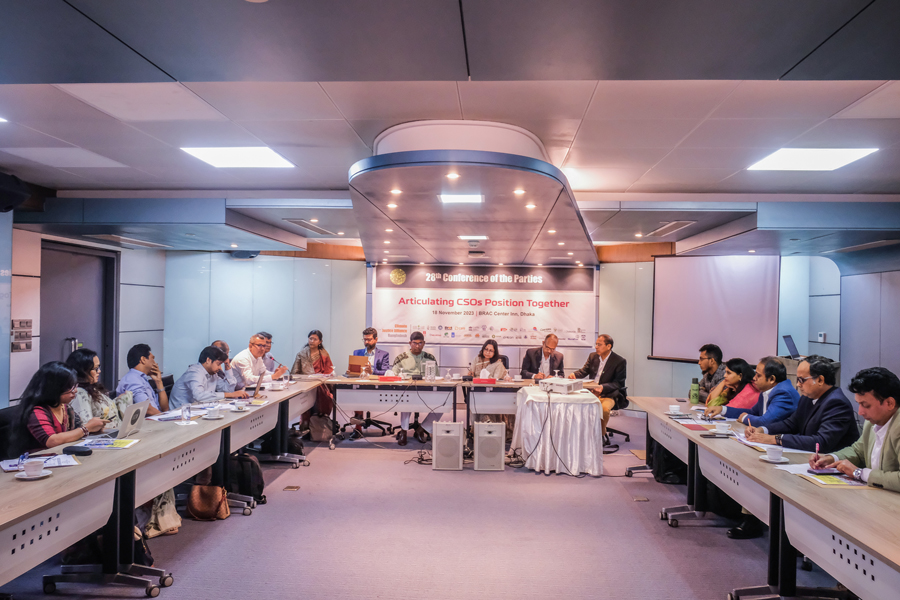
Published :
Updated :

Civil society organisations (CSOs) have unequivocally called for decisive action at the upcoming COP 28 to phase out fossil fuels and limit global warming to 1.5 degrees Celsius.
Emphasising the urgency of the matter, they also urged for clear, transparent, and comprehensive directives in the next iteration of Nationally Determined Contributions (NDCs) with revised benchmarks for 2030, along with commitments for 2035.
These commitments must align with the 1.5 degrees Celsius goal and necessitate systemic transformations, the CSOs emphasised.
In a roundtable discussion titled ‘COP 28: Articulating CSOs Position Together,’ organised by a CSOs alliance comprising 33 organisations and coordinated by the Centre for Participatory Research and Development (CPRD), there were also demands for a clear definition of climate finance at COP 28.
Climate finances should be recognised and mobilised as need-based, urgent, and obligatory rather than voluntary contributions, they said.
Shamsuddoha, the keynote speaker at the event, stressed the importance of reviewing the Transitional Committee Co-chairs’ proposal on the institutional and governance arrangements of the loss and damage fund.
Shamsuddoha urged the removal of elements contradicting the convention’s overarching principle and undermining climate justice.
He proposed a sovereign governance structure for the Loss and Damage (L&D) fund under the UNFCCC, with flexible norms, operational guidelines, and access modalities for Least Developed Countries (LDCs), Small Island Developing States (SIDS), and climate-vulnerable countries.
Furthermore, he emphasised the need for the Global Green Climate Fund (GGA) to focus on the human and social dimensions of climate change impacts on people, livelihoods, and ecosystems.
Speaking at the function, lawmaker Barrister Shamim Haider Patwary, also a member of Climate Parliament Bangladesh, acknowledged Bangladesh’s historical role in proposing the 1.5-degree Celsius goal in climate negotiations.
He also highlighted the trust deficit as the greatest gap, underscoring the importance of a specific strategy for COPs.
Dr Fazle Rabbi Sadeque Ahmed, deputy managing director of the Palli Karma-Sahayak Foundation (PKSF), emphasised the crucial role CSOs play in achieving climate justice for vulnerable populations.
He commended the initiatives undertaken by the CPRD-led alliance and urged government delegates to carefully consider recommendations from various platforms.
Dharitri Kumar Sarkar, deputy secretary, Ministry of Environment, Forest and Climate Change, drew attention to the escalating financial demands for addressing climate change-induced challenges.
He pointed out the substantial gap in establishing adequate climate finances for adaptation measures, criticising the developed world’s double-standard position of acknowledging climate change while inadequately admitting its impacts.
Khodeja Sultana Lopa, country director, Diakonia, Bangladesh; Hasin Jahan, country director, Water Aid Bangladesh; Dr Golam Rabbani, head of the Climate Bridge Fund; and many other CSO activists and representatives were present.
CPRD Research Officer Sheikh Nur Ataya Rabbi delivered the keynote presentation.
sajibur@gmail.com


 For all latest news, follow The Financial Express Google News channel.
For all latest news, follow The Financial Express Google News channel.